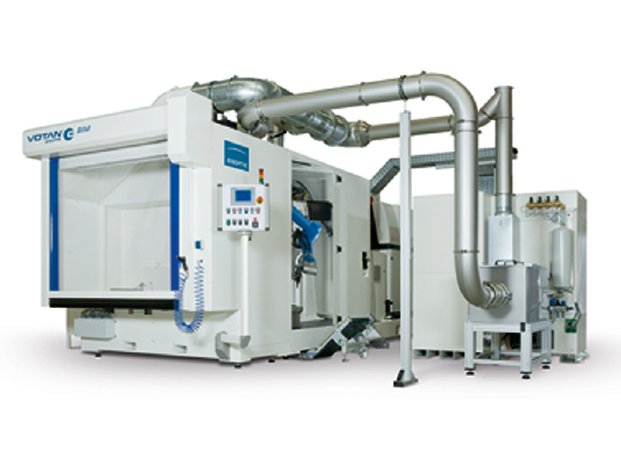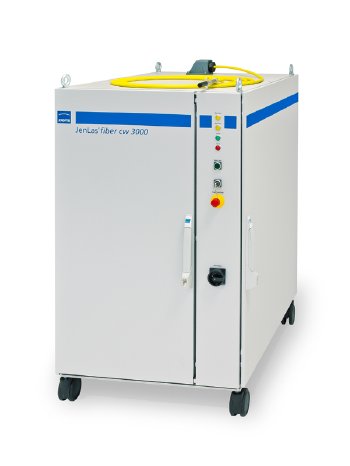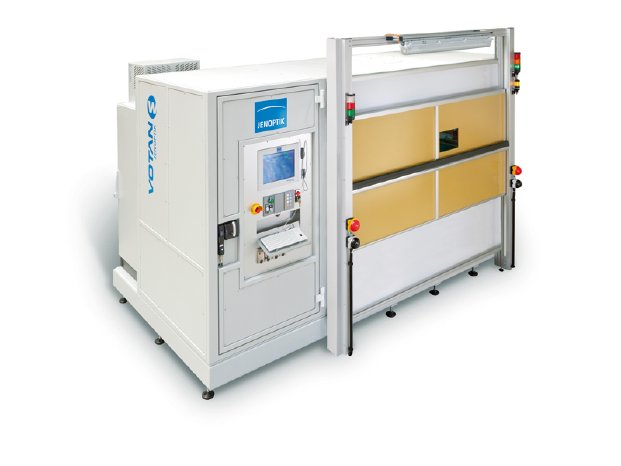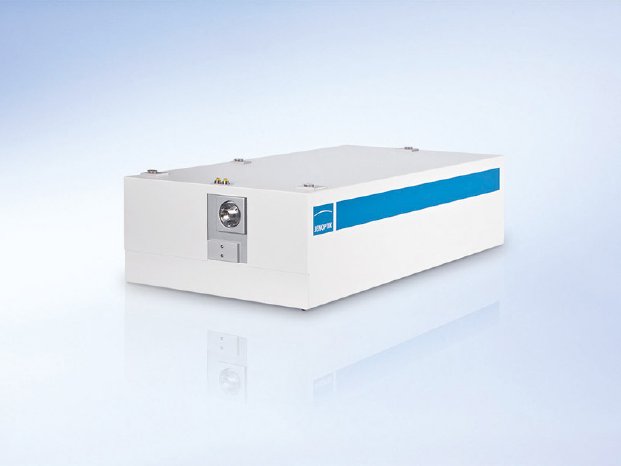Precise 3D metal processing requiring minimum space
The robot-based laser machine for 3D metal cutting – the JENOPTIK-VOTAN® BIM (Beam in Motion) – provides industrial producers with a highly flexible, fast and cost-effective solution for the processing of metals and plastic materials.
The heart of the JENOPTIK-VOTAN® BIM laser cutting system is a laser robot arm in which the laser beam is fully integrated. The laser beam is coupled in through the robot foot so that the transport fiber does not need to be moved within the working space. In this way, not only the costs of maintenance and renewal are minimized, but the system itself is minimized as well. The small laser cutting head that weighs only five kilograms can easily access even the narrowest areas. This is the only way to achieve the high path accuracy and the very high level of system dynamics necessary for 3D processing. With a repeat accuracy of ±100 µm this laser machine by Jenoptik ranks among the most precise systems of its class. Moreover, the axis movements of the Jenoptik laser arm are up to 60 percent faster than the current standards, thus allowing for a significantly shorter cycle time.
The JENOPTIK-VOTAN® BIM components have a modular structure so that they can be arranged within the space flexibly to suit the processing task. As an alternative, they can also be mounted on a platform measuring about 12 m² and accommodating the robot, the laser, the switch cabinet and a turntable that supports maneuverable sequences and continuous cutting. Hence, the JENOPTIK-VOTAN® BIM can be transported and positioned easily using a forklift truck which helps to optimize installation time.
In order to achieve an optimal result for a variety of applications, Jenoptik also offers more system variants in addition to the compact JENOPTIK-VOTAN® BIM individual plant. These variants are based on the BIM robot module that has an open interface for integration into an overall plant concept. Possible variants are a system with a feeding robot conveniently holding a 3D-shaped tube or other part in front of the processing robot, or a multi-robot system. In this way, it is possible to set up a highly productive processing system comprising several robots and using minimum space, where the robots can work on a part simultaneously, thus providing maximum flexibility and enhancing performance. The different system concepts will be optimized further and adapted to customer-specific requirements and applications in the near future.
The JENOPTIK-VOTAN® BIM laser machine is primarily used in the automotive industry to cut highly complex 3D car body parts and structural parts as well as hydroformed tubes, e.g. for exhaust systems, precisely and within seconds. In addition, manufacturers can benefit greatly from the dynamic capability of the machine which facilitates the laser-based cutting of contours and functional holes in so-called white goods, in tanks and containers.
You can see a live demonstration of the 3D robot system with a built-in JenLas® fiber cw 3000 as well as the 3 kW fiber laser in the Robotic & Automation Area in hall 4 at the LASYS trade fair in Stuttgart.
Multi-kilowatt fiber laser for metallic material welding and cutting
The JenLas® fiber cw 3000 by Jenoptik that will be shown in the Robotic & Automation Area at the LASYS together with the 3D robot system is also suitable for metal processing. With the development of this multi-kilowatt fiber laser with an output power of up to 3,000 watts Jenoptik’s Lasers & Material Processing division is extending its range of products for use in industrial material processing.
The JenLas® fiber cw 3000 is perfectly suitable for cutting and welding metallic materials in thicknesses of several millimeters. At the same time, the system ensures high productivity and excellent processing quality. Especially when cutting hot-formed high-strength steels, the laser works very efficiently and effectively.
Jenoptik has been developing laser systems for industrial material processing for years and is thus capable of quickly and flexibly integrating the lasers into the respective processes of customers all over the world. The JenLas® fiber cw 3000 ideally complements the Jenoptik fiber laser product line as it opens up new possibilities in industrial material processing to the user, particularly when it comes to the cutting and welding of metallic materials.
Contactless laser welding of plastic materials
Where plastic materials are cut, welded and perforated, e.g. among automotive manufacturers and their subcontractors, laser technology is an established and recognized method. The increase in equipment components in the vehicle interior and the growing demand for safety permanently confront automotive manufacturers with new challenges that can reliably be met with the help of the JENOPTIK-VOTAN® W.
At the LASYS 2014 Jenoptik will present its latest development in the field of plastics welding. In order to broaden the spectrum of applications of laser penetration welding, Jenoptik has developed a welding process involving a laser line that can be activated and deactivated in sections. This novel process has already been applied successfully in the industry several times.
Essential benefits of this new technology are not only the contactless joining technique without any mechanical and thermal influence, but also the high productivity at comparatively low operating costs. This technology is applied in the laser penetration welding of large plastic parts, e.g. shot channels in instrument panels or door linings.
This newly developed laser welding technique works with innovative Jenoptik diode lasers with a width of 10 millimeters (mm) and an optical laser power of up to 100 watts per submount in the standard wavelengths of 808, 940 and 980 nanometers. The diode laser line that can be switched on and off in sections comprises eight diode laser submounts in a compact housing and forms a line with a total length of about 100 mm. Each submount can individually be activated and deactivated depending on the contour to be welded. In this way, nearly any welding geometry can be generated. By adding several diode laser lines to form one overall line – the so-called diode nest – nearly all part sizes up to an area of 1,500 mm x 600 mm can be welded very productively and in only one pass.
In the JENOPTIK-VOTAN® W laser welding system the diode nest moves along a linear axis over the parts to be joined and firmly welds them to each other without causing marks (points of incidence) on the décor side or thermal distortion – and all that at welding speeds of up to 100 mm/s. In order to guarantee a consistent weld quality, the entire welding process takes place under online process control for quality assurance. Compared directly to alternative joining technologies, the strength values (pull-off forces) of the welded joints are 25 percent higher on average.
You can see a live demonstration of the switchable laser line at the LASYS in Stuttgart, hall 4, stand no. B71.
New ultrashort pulse laser JenLas® femto 10 features high performance for “cold” and clean micro material processing
With the enhanced JenLas® femto 10, Jenoptik presents the consequent further development of this product line, also at stand no. B71 at the LASYS 2014. Since the year 2009 Jenoptik has been offering femtosecond lasers for industrial material processing. The JenLas® femto 10 opens up new fields of application in “cold” and thus thermally non-destructive laser-based micro material processing, ensuring clearly higher productivity at the same time.
Based on the reliable diode-pumped disk laser technology, the JenLas® femto 10 reaches pulse energies of up to 50 microjoules and pulse frequencies of up to 500 kilohertz at an average power of up to 10 watts. Thanks to the acousto-optical modulator (AOM) integrated as standard, single pulses as well as arbitrary pulse frequencies and sequences can be generated. The laser emits at 1,030 nanometers (nm) or at 515 nm where an optional frequency doubler (SHG) is integrated. The pulse length is shorter than 800 femtoseconds, thus facilitating the effect of the so-called non-thermal ablation for nearly all materials which is essential for micro material processing.
One advantage of non-thermal ablation is that it enables the creation of extremely small work piece and surface structures without melting the material or exerting any other thermal influence. Cut edges are burr-free and clean which allows for savings in downstream work steps. Example products in terms of cutting and drilling are medical implants such as stents made of nitinol, stainless steel or polymers, injection nozzles or watch components. Hard and brittle materials such as diamond and glass as well as composite materials like CFK can be processed very well, too. Moreover, the laser is suitable for the removal of thin layers or for the structuring of surfaces, e.g. in the semiconductor industry.
The JenLas® femto 10 was developed for demanding applications in industrial environments. Particular importance was attached to easy system integration and perfect beam parameters, high stability and reliability. Furthermore, Jenoptik supports customer-specific application tests and ensures worldwide service.
Downloadable pictures of the individual products can be found in Jenoptik’s image database at Lasers & Material Processing / Press.
Jenoptik’s Lasers & Material processing division will also be represented at the 2014 Stuttgart Laser Days that will take place in parallel to the LASYS: On June 25, 2014 at 12:05 p.m. Dr. Ekkehard Werner will speak about “Fiber-coupled Diode Lasers with Highest Brilliance” within the framework of this user forum.
Jena, May 14, 2014




